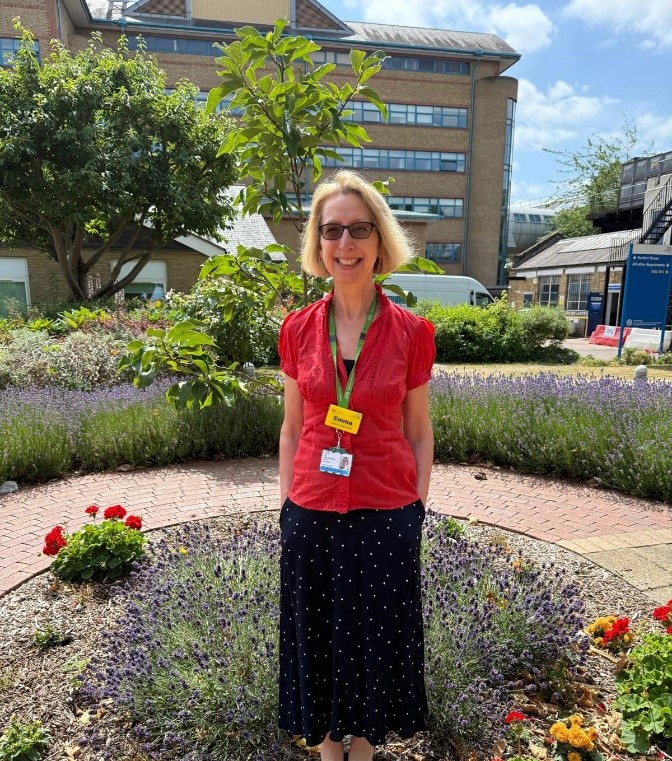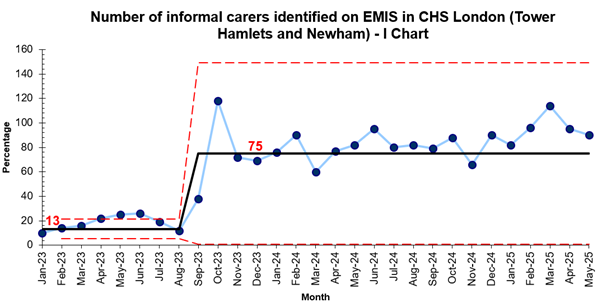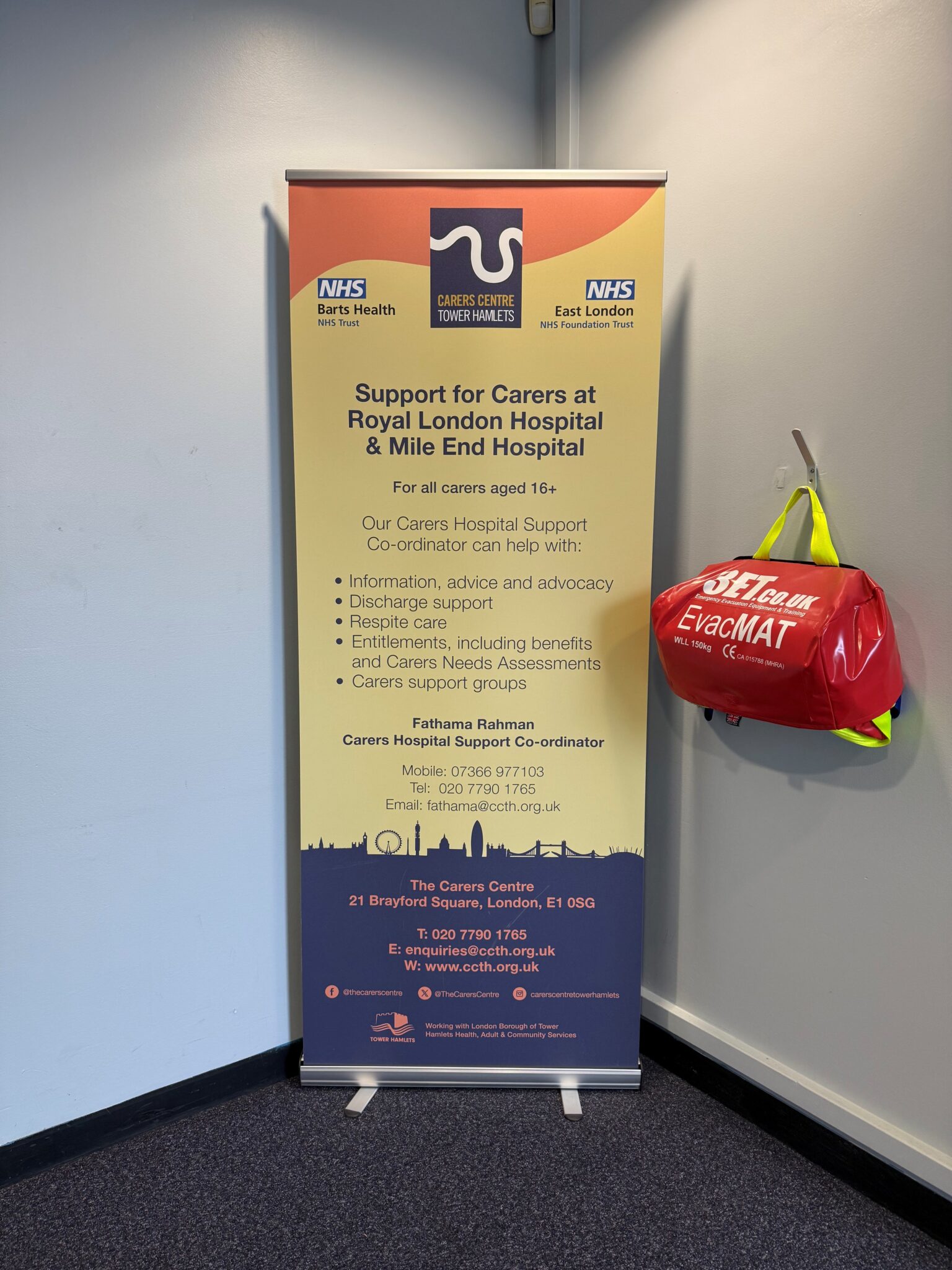
Caring about equality for carers in Community Health Services
1st July 2025
Written by Emma Robinson (Deputy Head of Unplanned Care and Specialist Nursing), Charan Saduera (Associate Director for Quality, Performance and People Participation, London Community Health Services), Sharon Eplett (Head of Quality and Performance, Bedfordshire Community Health Services) and Clarissa Sørlie (Improvement Advisor)
A new report from Carers UK (2025) urges health services to identify informal carers in a proactive and systematic way, to help meet carers’ needs. Initiatives across community health services (CHS) in London and Bedfordshire are embedding this in everyday practice across their services.
 Figure 1. Emma Robinson, project lead
Figure 1. Emma Robinson, project lead
According to a recent estimate by Carers UK (2025), 11.9 million people are providing unpaid care in the UK. 43% of carers report a worsening of their physical or mental health since taking on a caring role, a figure which rises to 57% for young carers. Carers may cancel their own medical appointments, reduce their social connections, face financial disadvantages and experience employment challenges.
‘Visibility’ is a key element of the East London NHS Foundation Trust Carers Strategy (2022), which promises: “to recognise those with carer responsibilities and proactively connect both young and adult carers into the support services and involvement opportunities available to them.”
There are many reasons to increase the identification of informal carers. For example, it can improve outcomes for the person receiving care, reduce isolation and support carers to stay in work and education (East London NHS Foundation Trust, 2022). Recognising this, Emma Robinson (Deputy Head of Planned Care and Specialist Nursing) started a quality improvement (QI) project in 2023 to improve identification of informal carers in Tower Hamlets.
In 2023, an average of nine carers were identified each month in Tower Hamlets CHS. Within a year, the team saw a four-fold increase in identification of carers on the electronic record system (EMIS).
One of their key change ideas was to work with colleagues in Newham to develop a new EMIS template, which prompted staff to include carers in discussions and to ask about carers’ support needs.
Two years since the start of the project, almost six times as many informal carers are being identified each month across both Tower Hamlets and Newham, from an average of 13 to 75 carers identified per month.
 Figure 1. Control chart showing a 477% increase in informal carers from an average of 13 to 75 per month across Tower Hamlets and Newham
Figure 1. Control chart showing a 477% increase in informal carers from an average of 13 to 75 per month across Tower Hamlets and Newham
This means that many more carers are offered support for their own needs. Once identified, they are referred for carers needs assessments and are signposted to the Carers Centre for benefits advice, respite guidance, carers support groups and advocacy.
Figure 2. Banner at Tower Hamlets CHS outlining support available to carers
Reflecting on the success of the project, Emma said, “It’s been a privilege for me to lead a QI project around something so close to my heart. I was so lucky to have a project group who felt equally passionate about improving things for informal carers, as well as amazing support from Clarissa Sørlie, our Improvement Advisor. I am thrilled this project seems to have made such a sustainable and ongoing difference in relation to raising awareness of informal carers and their impact.”
Colleagues in Bedfordshire are now adapting the template to reflect the nuances of their local context. They are also exploring ways of increasing identification in under-represented groups. “We know there are pockets of people who we are not reaching as well as we could, and we are working to improve equity” says Sharon Eplett (Head of Quality and Performance, Bedfordshire CHS).
Identifying support and resources available to carers is a key part of this work. For example, in recognition of how difficult it can be for carers to attend appointments for their own health, carers in Bedfordshire are able to access at-home health checks.
“This QI project has played a pivotal role in uniting our various workstreams around the recognition and support of informal carers,” says Charan Saduera (Associate Director of Quality, Performance and People Participation, London CHS). “Informal carers are essential to the sustainability of our healthcare system, and it is imperative that we future proof our systems and processes to meet their needs.”
“As an unpaid carer myself, I understand both the challenges and rewards involved. Any one of us could find ourselves in a caring role at some point in our lives, which is why getting this right is everyone’s responsibility. Moving forward, our plan is to continue collaborating closely with system partners to ensure that unpaid carers receive the support and care they so rightly deserve.”
Reference:
Carers UK (2025) Caring About Equality: Carers Week Report 2025. Available from: https://www.carersweek.org/media/qxnkcnn0/carers-week-report-2025-web_small.pdf [Accessed: 10th June 2025]
East London NHS Foundation Trust (2022) East London Foundation Trust Carers, Friends and Families Strategy 2022-2026. Available from: https://online.fliphtml5.com/bnexl/ziwt/ [Accessed: 19th June 2025]
Most Read Stories
-
Why is Quality Control important?
18th July 2018

-
An Illustrated Guide to Quality Improvement
20th May 2019

-
2016 QI Conference Poster Presentations
22nd March 2016
-
Recognising Racism: Using QI to Help Take Action
21st January 2021

-
Using data enabled us to understand our problem
31st March 2023

-
QI Essentials: What does a Chief Quality Officer do?
18th March 2019


Follow QI on social media
To keep up to date on the latest concerning QI at ELFT, follow us on our socials.



